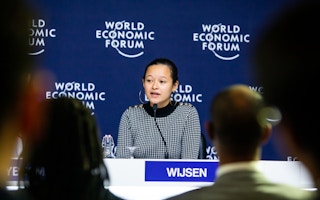23-year-old Melati Wijsen has a decade-long track record of agitating for climate action.
To continue reading, subscribe to Eco‑Business.
There's something for everyone. We offer a range of subscription plans.
- Access our stories and receive our Insights Weekly newsletter with the free EB Member plan.
- Unlock unlimited access to our content and archive with EB Circle.
- Publish your content with EB Premium.
From being greeted with coos of “so cute” as a 12-year-old fighting to end plastic pollution on her home island Bali, the Indonesian-Dutch activist now commands the attention of world leaders — co-chairing the World Economic Forum’s Global Plastic Action Partnership (GPAP) committee in 2019.
The indefatigable activist’s string of accolades have drawn admirers who have told her, “I wish my kid was more like you” and that “we need more Melatis in the world.”
Her response? “No, we don’t. Because we need so many more people to just show up and contribute their unique strengths,” Wijsen told Eco-Business.
“
If you want to start your changemaking journey, it doesn’t mean you have to start something new. There are so many solutions out there, so many different ways that you can contribute.
“Are you an event organiser? Are you a writer? Are you a researcher? Add your strengths to the movement and find an organisation that exists, or if [it doesn’t exist] yet — how can you add to what’s missing in the community that you’re a part of and to the movement that we see globally?”
These days, Wijsen positions herself more as a bridge between industry leaders and youths in the climate movement. “Over the last 10 years I’ve learnt that my strength is to be in [board]rooms and to start or facilitate those narratives between young people and corporate and policy decision makers,” she said.
Over the years, in her speaking engagements with youths around the world, Wijsen began noticing a gap in the know-how among young people who wanted to be part of a larger movement for change. Thus, in 2020, Youthtopia was born. The platform offers peer-to-peer programmes and opportunities for collaboration — not just among young people, but for brands looking to work alongside youths to scale solutions for change.
“The unique element about our generation is that we recognise collaboration is key,” Wijsen said.
The organisation currently works with 200 changemakers between the ages of 12 and 25 from over 50 countries to put the United Nation’s 17 Sustainable Development Goals (SDGs) into action through their projects.
Wijsen always encourages aspiring changemakers to find their footing through volunteering with one of Youthtopia’s 200 projects, or any other existing local organisations from where they reside. “Through hands-on involvement you can learn about what you enjoy and what you’re really good at, and from there start building how you will contribute at scale,” she advised.
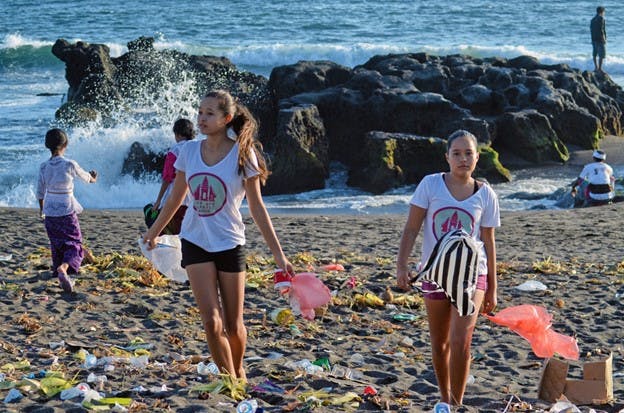
Melati (left) and her sister Isabel Wijsen (right) at a beach clean up. Image: Bye Bye Plastic Bags
Bali, known for its beautiful beaches, mountains and rice fields, draws throngs of tourists all year round. But its famous beaches like Kuta and Legian have increasingly become buried in plastic waste of up to 60 tonnes each day during the monsoon season. The growing amount of trash washing up on Bali’s shores — which the current waste management system is ill-equipped to handle — comes from neighbouring islands like Java, and even as far out as the Pacific Ocean.
“At the age of 10 and 12 years old one day, my sister and I just said, ‘What are we going to do about it?’ And the rest is pretty much history,” recounted Wijsen. She emphasised that “people power” was ultimately what helped achieve the ban on single-use plastic bags, straws and styrofoam in Bali in 2019.
“I saw firsthand through the work of Bye Bye Plastic Bags working with hundreds of partners on the island over the last 10 years, that community effort was the most powerful tool [for change],” said Wijsen.
Wijsen’s successful mobilisation of youths to ban single-use plastic bags in Bali and her continued work to empower young people globally to enact change at scale has earned her a place on the Eco-Business Youth A-List 2022, which recognises youths driving impact in Asia Pacific.
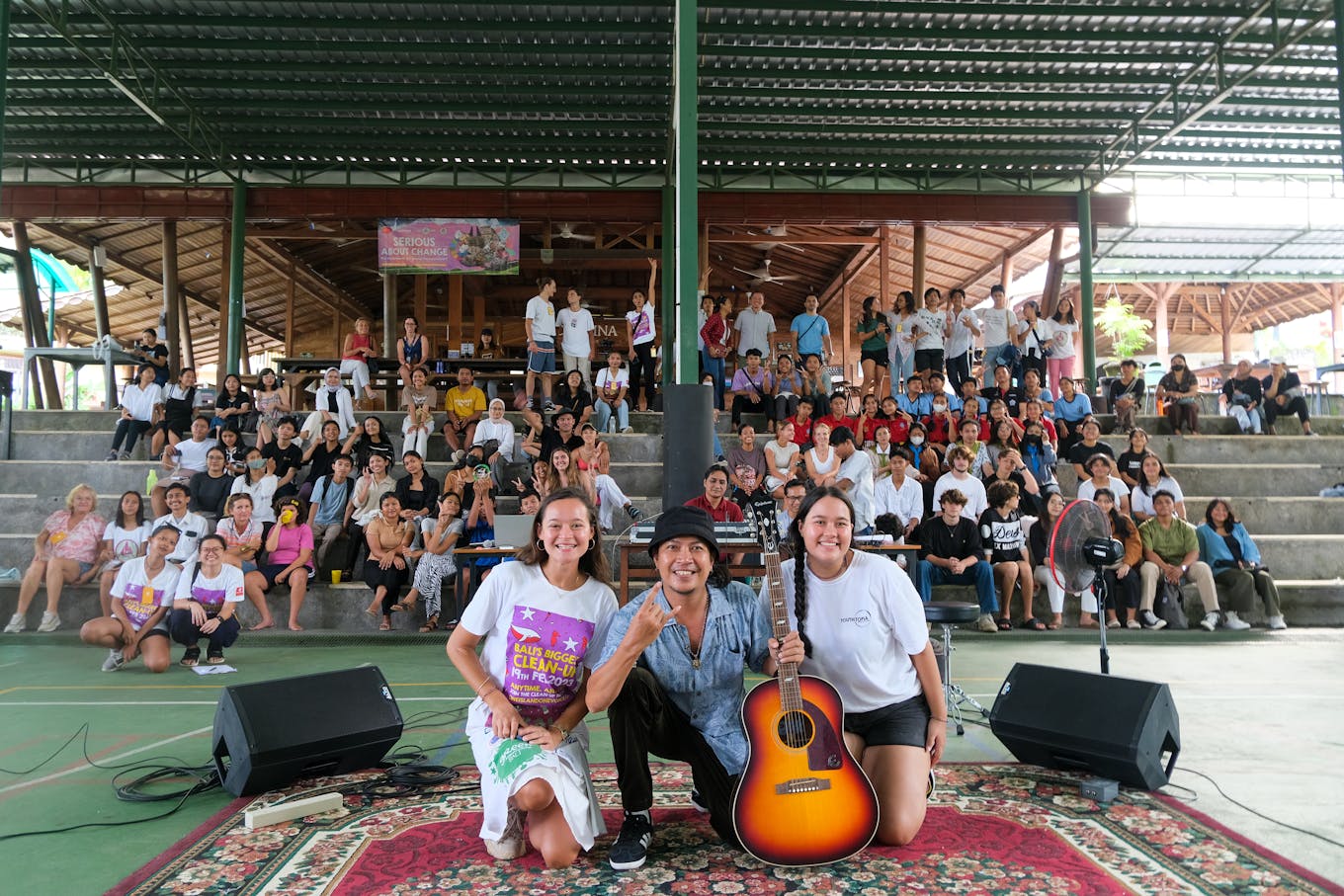
Melati (left) and Isabel (right) Wijsen at the Bali Youth Summit 2023, held during the seventh annual Bali’s Biggest Clean Up on 19 February at Canggu Community School. Image: Youthtopia
Under the movement One Island, One Voice, the Wijsen sisters have been organising massive environmental clean-ups annually since 2016 and inviting businesses in Bali to commit to eliminating their use of single-use items. To date, the movement has gathered over 70,000 people in 560 locations across the island and prevented 203 tonnes of inorganic waste from entering the oceans.
Wijsen sat down with Eco-Business to lift the veil on what life as a full-time changemaker entails and to reflect on how to prevent youth-washing when young people decide to engage with corporations and politicians.
It’s been 10 years since you and your sister founded Bye Bye Plastic Bags. How have you grown as an activist and beyond that, as a person?
I have to thank my 12-year-old self for being brave enough to start because honestly, without the projects, I would have no idea who I would be. Personally, because this is the 10-year mark, it’s quite a big reflective year for me as well.
Looking back, the response when we entered the room was “so inspirational, so cute”, and you can definitely guess that was not what we were going for. Today when I enter a room there’s a lot of people who are very impressed with the 10-year track record, and I can proudly say that I’m a full-time changemaker.
So it’s been an evolution from being a young kid with a big dream, to someone who has dedicated half of her life to contributing to change. Bye Bye Plastic Bags and the experience of leading change has also allowed me to grow as a public speaker, to grow in the skills of creative thinking and critical thinking, and most importantly, to understand the power of teamwork because we cannot achieve change working on our own.
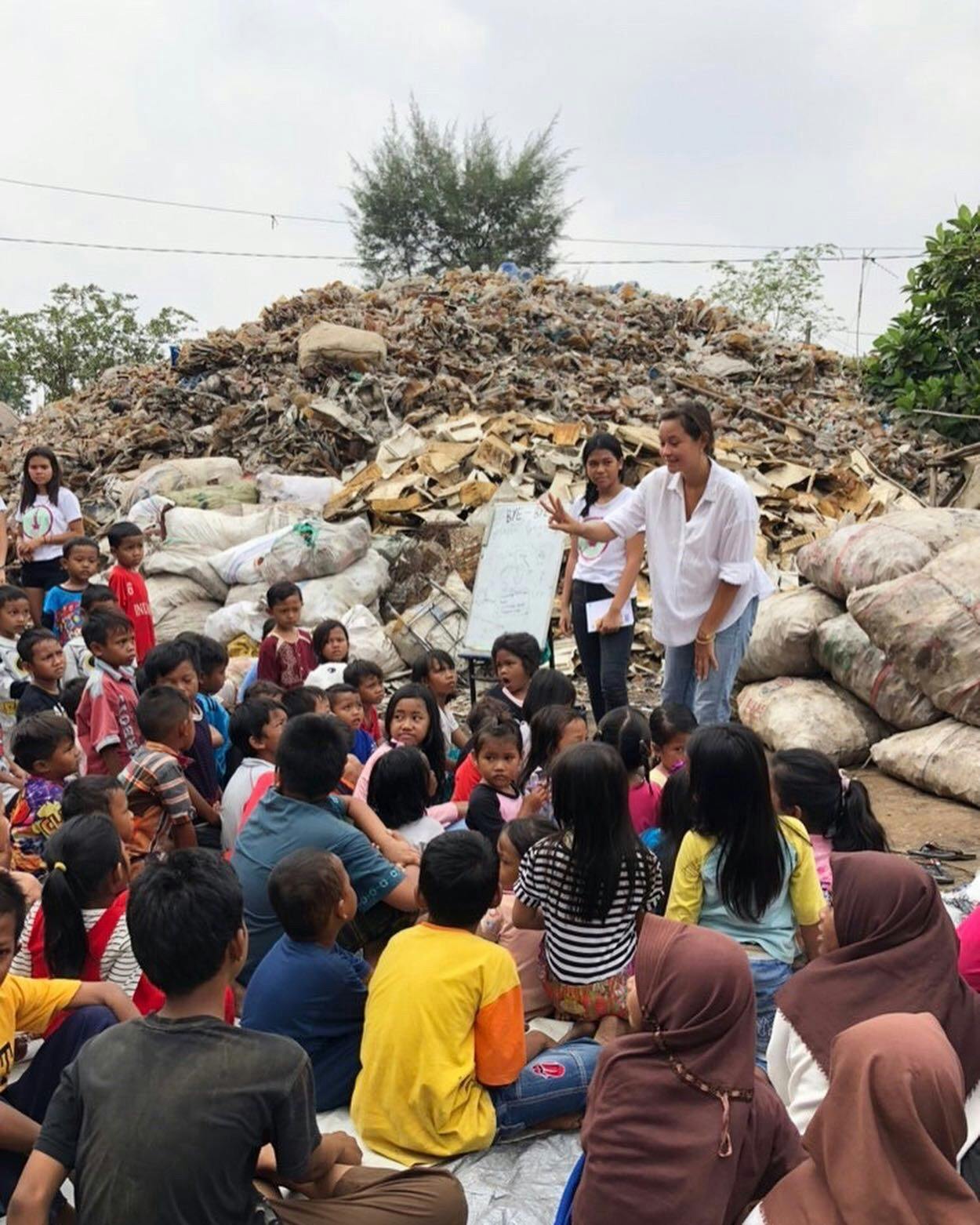
Melati Wijsen at Bantar Gebang, one of Asia’s largest landfills, with Bye Bye Plastic Bags Jakarta in 2019. Image: Bye Bye Plastic Bags
What is one common misconception people have about what you do as a full-time activist?
I think the biggest myth when it comes to activism is that you can turn it on and off, like there’s a switch [on] button from 9 to 5 and you can call it a day. But for me, especially in the last 10 years — that’s half of my life’s track record — it’s ongoing. In every moment and every decision, you are a changemaker.
That’s also the narrative shift that we need to start seeing, where everybody is a changemaker. It’s with the decisions you make every single day, it’s with how you lead life. It’s equally in the small things and big things, working towards the world we want.
Once we have that narrative in place, we can break down the myth that activism is for a select group or that activism is a “job”. It’s for everybody. Everyone is more than welcome to lead by example, every single chance they get.
Many young changemakers like yourself are juggling many projects at once. Is it good to encourage youths to aspire to this way of life?
I’ve started five projects that have now become movements of their own: Bye Bye Plastic Bags, One Island, One Voice, Mountain Mamas, Youthtopia, and then me as a person, which is also kind of a project.
I think the reason you see that common trend [of juggling multiple projects] within our generation, is because once we get started on achieving a solution, we uncover 100 other problems that need solving as well. So it’s the ability and resilience of our generation to be able to problem-solve. I think that that’s where it comes from, propelled by the knowledge that we don’t have the luxury of time.
What’s really important and what I wanted to mention in response to your question: I don’t think it’s right for anybody to say to young people that they are the ones to solve all the world’s problems. That’s not the role of young people. We do not need every single young person to create their own project. That would be like working on different projects that already exist, but everybody wants to start their own thing and that’s not what we [at Youthtopia] are promoting whatsoever.
I understand you experienced burnout a few years back. How did you navigate that season of your life and how are you instructing other changemakers facing burnout?
I think burnout is inevitable. But it’s also one of the most powerful moments in life where you have to sit with yourself and say, “What is my ‘why’? How do I come out of this and what am I fighting for?”
I think every activist comes out of their burnout with a stronger feeling of purpose, or they pivot and they change their focus to align better with what works for them. That’s also a different way to look at burnout and not put shame on it, but instead create spaces where we’re able to talk openly about these emotions and these experiences, and help each other out of it.
You and other youth activists have brought up this idea of “youth-washing”. Should youth activists engage with corporations and politicians when given the chance to?
Oh my God! I love this question and I could go on all day about it, because it’s true. It’s another thing that I’ve seen in the past 10 years.
At first, in 2013, we were not making headlines as a youth movement. Suddenly, around 2018, when Greta [Thunberg] started Fridays for Future, the entire conversation about youth involvement in the climate crisis shifted.
“
Not every young person has to be part of boardroom decision-making and not every politician or corporation wants to engage with young people. So everybody has a role to play. There are so many different ways of changemaking.
Over the last 10 years, I’ve learnt that my strength is to be in those rooms and to start or facilitate those narratives between young people in our generation, and corporate and policy decision makers.
But of course, youth-washing was something that I personally experienced. Being invited [to speak at an event] as a 14-year-old, I thought, “Yes I got the stage, I got the invite!” And I’d stood there sharing a message straight from the heart, and after the standing ovation and applause and the photo, it was like, “Okay, thank you.” What’s next? It was a very big cliffhanger moment. I think that many young people have experienced this and that’s why the term youth-washing is now the new buzzword that’s making its way into these corporate rooms.
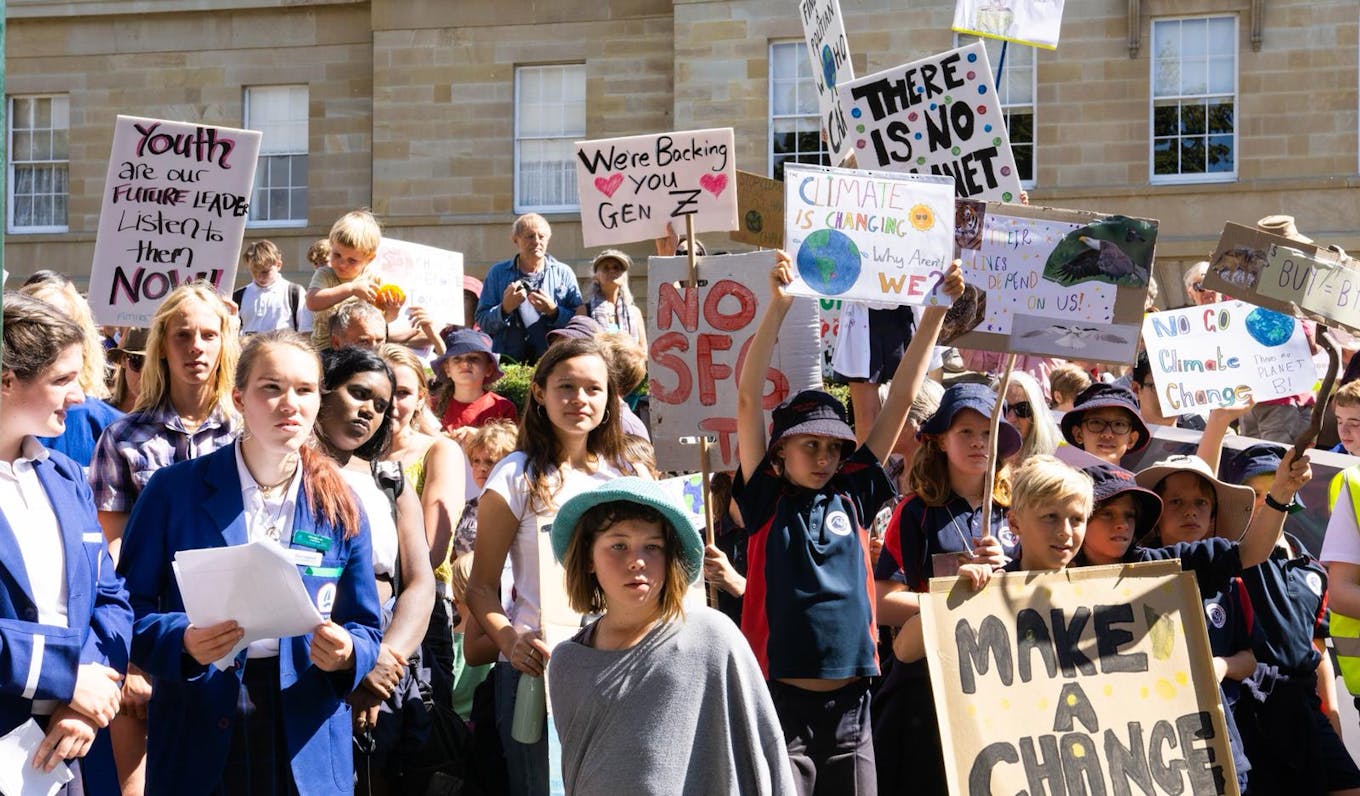
Melati Wijsen at a youth climate strike in Tasmania. Image: Bye Bye Plastic Bags
CEOs and general managers are also asking, “Well, how do we prevent youth-wash?” The intention and the willingness is there, but the know-how is not. That’s also what Youthtopia is focused on. Next to empowering as many young people as possible, we also have a programme to prevent youth-washing from happening. This is an 18-month commitment that we look for from these corporate leaders who want to engage with young people – not only for a surface-level one-time engagement, but through reverse mentorship and actual involvement in the decision-making of a company.
That’s how we at Youthtopia avoid youth-washing, while making sure that the bridge is always there between industry leaders and young people, because I do believe it is important if we want to achieve change.
Oftentimes when you look at the youth movement, the biggest barriers to our growth is funding, networks, and access to other mediums of capital. I think that’s where the corporate engagement allows us to scale. But we’re also in a position to influence [corporates] once those conversations are started.
Have you seen any fruitful collaborations or reverse mentoring experiences so far?
I remember a specific session about planet over profit and that was an interesting dialogue because obviously, when you come from a corporate background, that entire session was so irrelevant. [The corporate leaders] brought up that if they were not making profit, they couldn’t protect the planet. And it was like a chicken and an egg situation.
That was one of the biggest learning curves for us as a youth movement coming into these big decision-making rooms. You do have to learn how to speak their language, but hold true to your message and what you’re trying to get across.
In what ways do you want the climate crisis to be solved?
A real experience of this happening was the ban on single-use plastic bags, straws, and styrofoam in Bali in 2019. After six years of campaigning, our youth-led organisation — among so many other like-minded organisations — celebrated this incredible achievement as a result of people power and the community coming together to mobilise this change.
On a larger scale, what it would look like for me is definitely a world that is more dependent on renewable energy, versus the fossil fuel industry. It’s [a world] where — especially in Indonesia but also in other communities around the world — we listen and involve Indigenous leaders and youths in decision-making processes.
I do see it happening. But the only challenge now is that a lot of the time, I see it happening outside the conference rooms of decision-making processes. Outside of the official COP pavilions, there are youth summits and gatherings where Indigenous peoples are sharing stories, as well as private sector and small- and medium-sized enterprises showcasing their solutions. Now the challenge is to mix them into these spaces of decision-making power, so that we’re able to scale the change a lot faster and a lot sooner.
What is making you despair and what is giving you hope right now?
My answer for despair is always that change is happening far too slowly. This is the tenth year of Bye Bye Plastic Bags but today, even with a law in place, daily habits and daily interactions with plastic are still there. The implementation is not there yet, so that’s really what holds me at a low point.
What brings me back out of it is reminding myself that there are so many people every day who are leading by example, especially with the work that I do at Youthtopia. [Change] is happening globally and it’s happening with so many young people who are not waiting for permission nor expecting any policy change but are inventing solutions already. So that’s really what keeps me hopeful and what inspires me to keep on going every day no matter what.
Melati Wijsen was one of 10 sustainability leaders selected for the Eco-Business Youth A-List 2022. Read our stories with other A-List winners here.

